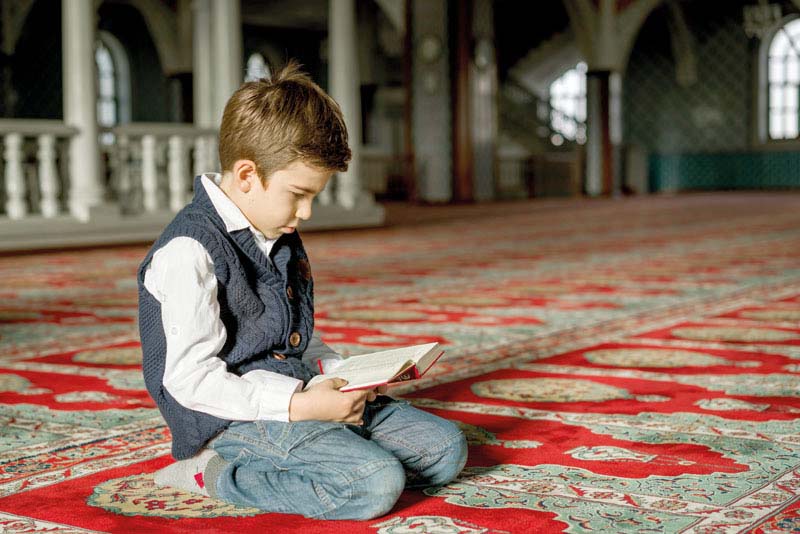How will these children love worship?
How will these children love worship?
If parents don't know what they believe in, why they believe it, and why they worship, how can they guide their children? In regions where different thoughts, cultures, and beliefs prevail, how can we instill love for Allah in our children's hearts? Here are the guiding proposals from experts and an exemplary mother...We all have memories of performing prayers imitating our elders, mimicking the recitation of prayers as if we knew, observing fasting like adults, and clumsily wrapping our headscarves. We were children raised in Muslim regions, amidst the call to prayer, in conservative environments.Talking about Allah in daily life was normal for us, decorating our sentences with "maşallah" and "inşallah," and seeing religion as a part of life. We were familiar with it all. But what about our minds and hearts? Did this familiarity add something to our thought and emotional world, enhancing our religious consciousness? Or did it empty our world of faith? How would the hearts of our children, growing up in regions where vastly different cultures and religions exist, nurture the seeds of Creator, servitude, and faith?Unfortunately, in the hands of parents who have not perceived the quality of religion within the quantity, how will they nurture the seeds of faith in their hearts with a minority psychology? Moreover, how much can they make what they believe visible and lived?THE MAIN ISSUE IS LOVEJust like everything else, when it comes to religion, the main issue is love. The bond that love creates cannot easily be broken by the permission of Allah. Just as a child bonds securely with its mother at a young age, this positively influences their entire adult life, from the decisions they make to the relationships they form. It helps them grow up to be confident and strong in character. Similarly, the bond of love established with the Creator during the early years of a child's life shapes their relationship with religion. The strength of their faith and the continuity and sensitivity of their worship all gain meaning through this love.FIRST THE PARENTS, THEN THE CHILDRENEducator and author Dr. Adem Akıncı says, "Worship should be presented to children as spiritual nourishment, a source of peace for humans. We should say, 'Worship gives us peace and comfort spiritually, it relieves us of our troubles.' We should present it as a treatment for our spiritual illnesses."So, can someone who doesn't even know the multiplication table teach students to solve complex equations like a math teacher? Similarly, can someone who hasn't yet found solutions to the problems of their own spiritual life teach them to someone younger? How will parents guide their children in this matter without knowing what they believe in, why they believe it, and why they worship? It seems that at this point, all parents need to reflect on their own spiritual world."THE LORD WHO LOVES DESPITE EVERYTHING"The trust he feels in the Lord who loves him despite his sins, mistakes, shortcomings, and sharp edges, his confidence in the Lord who answers all his troubles, was the only factor that would keep him steady in his religious values. It was only when the seeds of this love, despite everything, and unconditional trust were sown, along with the parents' efforts to set an example, the pains they endured in making their personal lives lived according to religion, and their prayers for their children, that this tree could grow.DON'T JUST TALK, LISTEN!At this point, Nihan Kılıç suggests that turning the microphone not to ourselves but to our children comes to our rescue, "Instead of telling them how worship is done, we should ask more questions. We should make sure that our children notice their feelings after each religious experience, answer the questions they wonder about, and when we cannot answer them, we should research together without hesitation."HOW TO ENCOURAGE?Adem Akıncı also says, "When it comes to worship, we should act according to the child's nature, wait patiently if our efforts do not yield results, and resort to different solutions." He shares an experience from his own life, "Sometimes verbal encouragement, praise, and kind words can be effective for children, and sometimes material incentives and rewards can be effective. For example, when I was in elementary school, my father really wanted me to recite the call to prayer at the mosque. When I recited the call to prayer for the first time, he sacrificed an animal. This affected me so much that I thought to myself; reciting the call to prayer must be a very valuable act of worship. After this incident, my perspective on the call to prayer and the mosque changed positively."Remember! The key to opening our children's hearts is in Allah's hands. It is up to us to love and guide His entrusted ones despite everything. Of course, it starts with ourselves.
/ / / / / / / /

